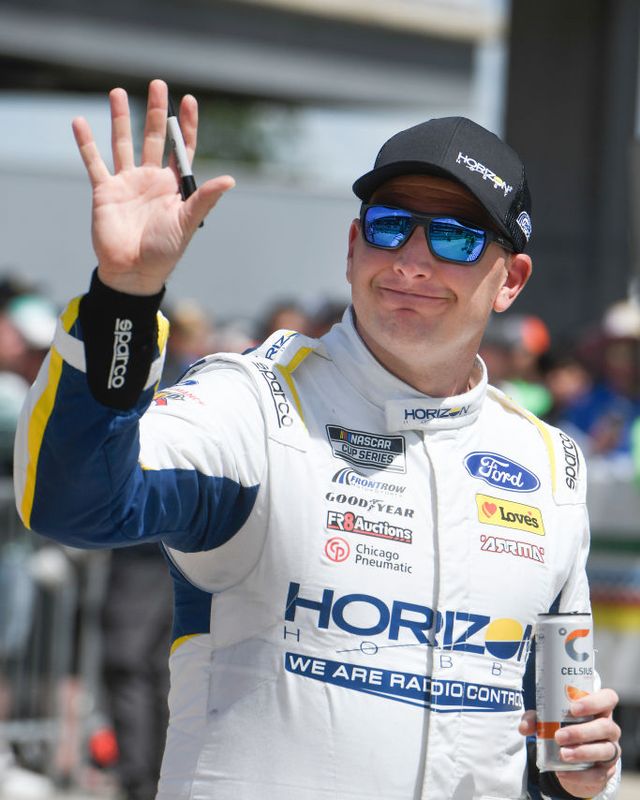- Closing the performance gap was one of three main objectives of the Next Gen car in NASCAR.
- The strong showings recently by two-car teams shows that the objective is being met.
- RFK Racing’s Chris Buescher won the Richmond and Michigan races, while Front Row Motorsports’ Michael McDowell claimed the Indianapolis road course race.
When NASCAR joined with the OEMs to create the current Cup car it had three objectives: Return each brand’s identity to its car; reduce the teams’ operating costs; and close the performance gap between the large operations and the smaller ones.
During the last three weeks, two-car teams have shown that at least one of those three objectives is coming to fruition as they have dominated victory lane.
RFK Racing’s Chris Buescher won the Richmond and Michigan races, while Michael McDowell claimed the Indianapolis road course race. McDowell’s victory was the first for Front Row Motorsports since 2021 when he won the Daytona 500. However, unlike the Daytona 500 win that occurred when McDowell’s No. 34 Ford slipped through a massive crash on the final lap, the Arizona native was a victory contender at Indy from the drop of the green flag.
“This Next Gen car has really helped us on the road courses,” McDowell says. “I think if you just look at the average finish and you look at average running position, we’ve been a top-5 car every single road course race since the Next Gen car has come in.”
Since NASCAR’s Next Gen car was introduced in the Cup series in 2022, McDowell’s only finish outside the top 15 on road courses occurred last year at the Charlotte Roval when he placed 27th. His only other finishes outside the top 10 in 10 road course races the last two years have been at Circuit of the Americas where he finished 13th last year and 12th this season.
In 2022, McDowell’s average finish in six road course races was 10.8. This year, in one street and three road course events, his average finish is 6.75. Prior to McDowell’s Indy victory, Front Row Motorsports was in contention to earn a playoff spot via points. However, now with a playoff berth in its pocket, McDowell and his team can go for a victory rather than race for just points this Sunday at Watkins Glen where he finished sixth last year.
Front Row Motorsports general manager Jerry Freeze said the team’s performance began improving in 2020 when NASCAR put a moratorium on the advancement of chassis and suspension components in preparation for the Next Gen or Gen-7 car.
“Once we were able to start getting them (parts) on a more level playing field with the product that we were bringing to the race track, our performance started to pick up,” Freeze says. “I think you started to see that a guy like Michael McDowell had a lot of talent.
“I think the way the rules have changed and with the Next Gen car coming in, it’s really kind of played in that mid-sized team’s favor that if you’re doing the right things, you can be competitive. We’ve just got to keep on investing in those areas to try and improve our team and become a more constant top-10 threat, and when making the playoffs isn’t such a big story. It’s maybe expected.”
In addition to the Next Gen car contributing to a more equal playing field, McDowell points to no Stage breaks during road course events as beneficial since his team fields a “good long run car.”
“It’s like capitalizing on opportunities,” McDowell says. “We knew this year that no Stages were going to create opportunities for us because we’ve always had to be in a must-win situation. We’ve never taken Stage points at the road courses. We’ve always pitted with two laps to go because we need the track position, we need to put ourselves in position to win. We were always racing track position with the Stage breaks.”
People often forget that before McDowell focused his career on NASCAR, he was a full-time road racer. In 2004 he won the USF2000 championship and he’s in the USF2000 Hall of Fame, but it’s been around 17 years since he’s competed fulltime on road courses.
“I think this Next Gen car probably was what I needed to be able to show what I could do,” the 38-year-old McDowell says. “It’s not just because it leveled the playing field. That’s part of it. The other part of it is it’s very similar to what I raced before going into the Cup Series with the Daytona prototype as far as the floor on the car, the downforce, the sequential shift, all those things. I’ve been really comfortable in this car since it’s unloaded, not just on the road courses, but the ovals as well. It’s played into my wheelhouse.”
Read the full article here



